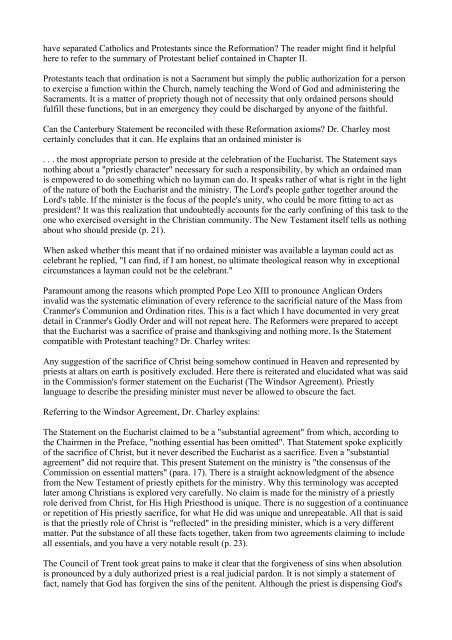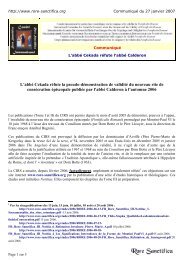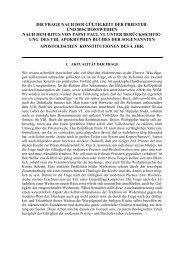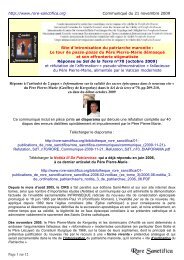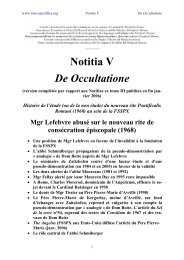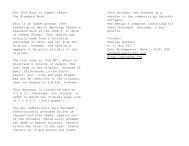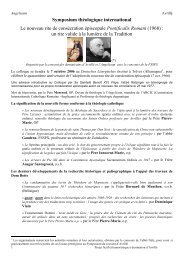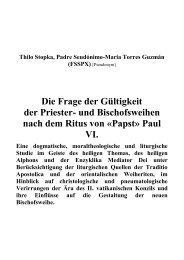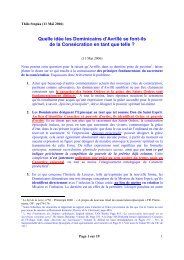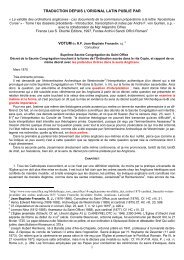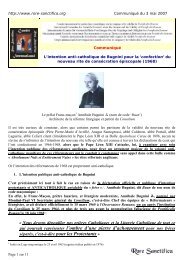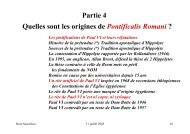THE ORDER OF MELCHISEDECH A Defence of ... - Rore Sanctifica
THE ORDER OF MELCHISEDECH A Defence of ... - Rore Sanctifica
THE ORDER OF MELCHISEDECH A Defence of ... - Rore Sanctifica
Create successful ePaper yourself
Turn your PDF publications into a flip-book with our unique Google optimized e-Paper software.
have separated Catholics and Protestants since the Reformation? The reader might find it helpful<br />
here to refer to the summary <strong>of</strong> Protestant belief contained in Chapter II.<br />
Protestants teach that ordination is not a Sacrament but simply the public authorization for a person<br />
to exercise a function within the Church, namely teaching the Word <strong>of</strong> God and administering the<br />
Sacraments. It is a matter <strong>of</strong> propriety though not <strong>of</strong> necessity that only ordained persons should<br />
fulfill these functions, but in an emergency they could be discharged by anyone <strong>of</strong> the faithful.<br />
Can the Canterbury Statement be reconciled with these Reformation axioms? Dr. Charley most<br />
certainly concludes that it can. He explains that an ordained minister is<br />
. . . the most appropriate person to preside at the celebration <strong>of</strong> the Eucharist. The Statement says<br />
nothing about a "priestly character" necessary for such a responsibility, by which an ordained man<br />
is empowered to do something which no layman can do. It speaks rather <strong>of</strong> what is right in the light<br />
<strong>of</strong> the nature <strong>of</strong> both the Eucharist and the ministry. The Lord's people gather together around the<br />
Lord's table. If the minister is the focus <strong>of</strong> the people's unity, who could be more fitting to act as<br />
president? It was this realization that undoubtedly accounts for the early confining <strong>of</strong> this task to the<br />
one who exercised oversight in the Christian community. The New Testament itself tells us nothing<br />
about who should preside (p. 21).<br />
When asked whether this meant that if no ordained minister was available a layman could act as<br />
celebrant he replied, "I can find, if I am honest, no ultimate theological reason why in exceptional<br />
circumstances a layman could not be the celebrant."<br />
Paramount among the reasons which prompted Pope Leo XIII to pronounce Anglican Orders<br />
invalid was the systematic elimination <strong>of</strong> every reference to the sacrificial nature <strong>of</strong> the Mass from<br />
Cranmer's Communion and Ordination rites. This is a fact which I have documented in very great<br />
detail in Cranmer's Godly Order and will not repeat here. The Reformers were prepared to accept<br />
that the Eucharist was a sacrifice <strong>of</strong> praise and thanksgiving and nothing more. Is the Statement<br />
compatible with Protestant teaching? Dr. Charley writes:<br />
Any suggestion <strong>of</strong> the sacrifice <strong>of</strong> Christ being somehow continued in Heaven and represented by<br />
priests at altars on earth is positively excluded. Here there is reiterated and elucidated what was said<br />
in the Commission's former statement on the Eucharist (The Windsor Agreement). Priestly<br />
language to describe the presiding minister must never be allowed to obscure the fact.<br />
Referring to the Windsor Agreement, Dr. Charley explains:<br />
The Statement on the Eucharist claimed to be a "substantial agreement" from which, according to<br />
the Chairmen in the Preface, "nothing essential has been omitted". That Statement spoke explicitly<br />
<strong>of</strong> the sacrifice <strong>of</strong> Christ, but it never described the Eucharist as a sacrifice. Even a "substantial<br />
agreement" did not require that. This present Statement on the ministry is "the consensus <strong>of</strong> the<br />
Commission on essential matters" (para. 17). There is a straight acknowledgment <strong>of</strong> the absence<br />
from the New Testament <strong>of</strong> priestly epithets for the ministry. Why this terminology was accepted<br />
later among Christians is explored very carefully. No claim is made for the ministry <strong>of</strong> a priestly<br />
role derived from Christ, for His High Priesthood is unique. There is no suggestion <strong>of</strong> a continuance<br />
or repetition <strong>of</strong> His priestly sacrifice, for what He did was unique and unrepeatable. All that is said<br />
is that the priestly role <strong>of</strong> Christ is "reflected" in the presiding minister, which is a very different<br />
matter. Put the substance <strong>of</strong> all these facts together, taken from two agreements claiming to include<br />
all essentials, and you have a very notable result (p. 23).<br />
The Council <strong>of</strong> Trent took great pains to make it clear that the forgiveness <strong>of</strong> sins when absolution<br />
is pronounced by a duly authorized priest is a real judicial pardon. It is not simply a statement <strong>of</strong><br />
fact, namely that God has forgiven the sins <strong>of</strong> the penitent. Although the priest is dispensing God's


